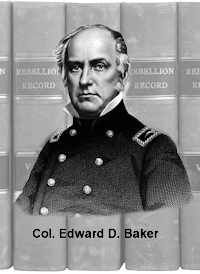March 27. — At Burlington, N. J., Rev. Samuel Aaron, a Baptist preacher, of Mount Holly, attempted to deliver an Abolition lecture, this evening. He commenced his remarks by denouncing the present Administration and avowing himself against the manner in which the war was conducted. At this the crowd began to hiss him, and storm him with rotten eggs. The ladies in the audience got frightened at these proceedings, and the excitement of the crowd rose to fever-heat, and there were angry cries of “Kill him,” “Tar and feather him,” etc The Mayor of the city was present, and tried to stop the excitement, but did not succeed in doing so. Finally the gentleman withdrew and was taken away from the hall by his friends. — N. Y. Commercial, March 28.
—The Petersburgh Express of this date, says that wood has become as scarce in that city as good coffee, and appeals to the farmers and railroads to relieve the distress. Brooms are pronounced a luxury, and the growing of broom-corn is earnestly recommended. So scarce has leather become, that hickory splits are recommended as a substitute in harnesses. In view of the scarcity of lead, merchants and others having old tea-chests, are recommended to bring them out for the lead they contain. “There is also,” says the Express, “a large quantity of lead on the various iron railings about the city, which the owners could spare.”
—The Board of Provost-Marshals of New-Orleans, consisting of N. Trefaguier, H. M. Spofford, Cyprien Dufour, H. D. Ogden, Victor Burthe, and Pierre Soule, by special order prohibited “the traffic in gold and silver against the notes of the confederate States of America,” and also declared that all traffic in paper currency, tending to create distrust in the public mind, or otherwise to produce embarrassment, should be held as acts of hostility against the government, and would be dealt with summarily.—New-Orleans Delta, April 4.
—Ashby’s cavalry, with a battery of four guns, appeared near Strasburgh, Va., and threw several shells into the Union camp, killing one man and wounding another. His position was such as prevented his being cut off. The Union guns, however, soon routed the enemy—Gen. Banks reconnoitred all positions within five miles of his camp, returning after dark.—Baltimore American, March 29.
—The National troops from General Hooker’s command are removing the guns from the abandoned rebel batteries on the Lower Potomac, tho gunboats Yankee and Wyandank being actively employed in this service. Large numbers of negroes from the Virginia side are pouring into Gen. Hooker’s camp since the rebels left that line of defence.—New- York Herald, March 27.
—A recosmoissance was made from Newport News, Va., as far as Big BetheL where the rebels were discovered to be posted to the number of one thousand five hundred. Upon the approach of the National troops, they vacated the place without showing fight, and Big Bethel was occupied by the Union soldiers.—(Doc. 110.)
—Two squadrons of the First New-Jersey cavalry, under command of Col. Wyndham, surrounded a party of rebel Texas Rangers near Dumfries, Va., twelve miles below the Occoquan. A few shots were fired on both sides without injury, except that one of the Nationals was slightly wounded in the wrist. Ten prisoners were taken and carried to Washington. The National troops captured a number of wagons loaded with wheat, but owing to the want of horses, were enabled to bring off only four of them.
—The Petersburgh, Va., Gazette of this date, complains that Gen. Burnside occupies “the palatial residence of the President of the Bank of Commerce;” that Gen. Foster “has taken possession of another handsome dwelling,” while Gen. Reno “occupies the Bank of Newbern.” It is charged that the Unionists are “plundering the country for miles around.”



